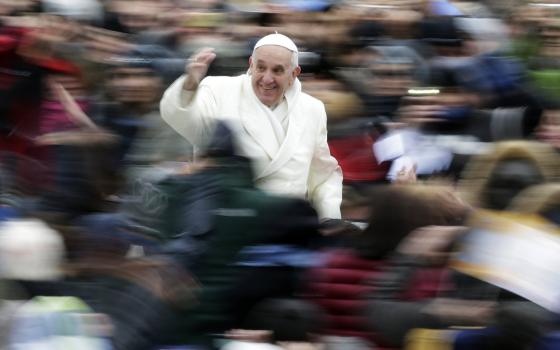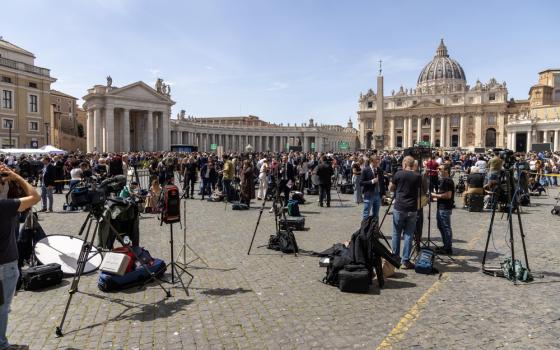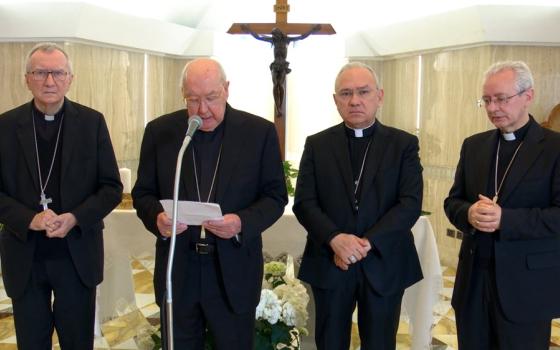The United States Commission on Civil Rights (USCCR) is not usually in the news, and it is better that way. But, their recent, misguided report on the relationship between discrimination and religious liberty, entitled "Peaceful Coexistence: Reconciling Nondiscrimination Principles with Civil Liberties," has caused a bit of a stir, and seemed designed to make "peaceful coexistence" less likely, not more. And, true to form, the United States Conference of Catholic Bishops took the bait, issuing its own tendentious statement in reply.
The last time the group made news was when one of its members sued to keep a president of the United States from appointing a member to fill her expired term. Before that, it made news because its chairperson, Mary Frances Berry, had a record of praising the freedoms found in the USSR and communist China while denouncing the United States. (Full disclosure: Berry used to be a regular customer at the restaurant where I worked. She was a lovely customer but as a scholar, she embodied the bonzo radical academy that I have long disliked.) A conversation with Berry was like watching an Oliver Stone movie. There was artistic flair, to be sure, but the ideas were goofy.
This history is important. Emma Green at The Atlantic wrote a fine analysis of the controversy, but I quibble with what appears to be the most innocuous statement in that piece: "Created nearly 60 years ago, the USCCR exists to advise the United States government on civil-rights issues, even though it has no power to enact or enforce any of its findings." That may be the statutory reason for USCCR's existence, but its political raison d'etre is to allow politicians a cheap way to give a nod to some of their more extreme supporters by appointing a favored radical to a position that has precisely no jurisdiction or power. In short, these are the kind of appointments that are sops to the fringe.
The current chairman, Martin Castro, rants in the most cited passage in the report: "The phrases 'religious liberty' and 'religious freedom' will stand for nothing except hypocrisy so long as they remain code words for discrimination, intolerance, racism, sexism, homophobia, Islamophobia, Christian supremacy or any form of intolerance." It is true that some of the same people fretting about religious liberty today were calling members of the LGBT community "perverts" only a few years ago. And there really are dog whistles in political life that guarantee people know you are thinking "perverts" even when you are not saying it. Still, Chairman Castro could have balanced such sentiments with a nod to those whose sincerely held religious beliefs are a threat to no one. There should be no doubt that the First Amendment mentioned the free exercise of religion for a reason, and while I am not an originalist, I do not see any evidence in the intervening 227 years since the Bill of Rights was proposed that having the government meddle in religion has become a good idea.
Interestingly, the majority report also cites approvingly the Supreme Court decision in Employment Division v. Smith. I say "interestingly" because that decision was authored by none other than the late Justice Antonin Scalia who is set to receive the John Paul II New Evangelization Award posthumously from the Catholic Information Center, a conservative outlet here in Washington, D.C. If anything shows the partisanship of the religious liberty issue, there it is: A radical leftie on the USCCR cites the conservative hero's jurisprudence on the very heart of the matter, and both sides behave as if nothing remarkable is going on. The rest of us have difficulty avoiding the conclusion that the whole U.S. Department of Health and Human Services (HHS) mandate brouhaha was a last ditch attack on the Affordable Care Act, driven by the bishops' general animus to President Obama or the late Cardinal Francis George's specific animus against the president, either one, combined with the fact that the bishops increasingly listened only to conservative political and legal voices.
In his response to the USCCR report, Archbishop William Lori, chair of the ad hoc committee on religious liberty at the USCCB, claims that the church only wants the "freedom to serve." What's stopping you? As has been argued here and elsewhere repeatedly, there is really no reason, so far as our church's teaching on cooperation with evil is concerned, for the Catholic church to insist that the accountant at Catholic Charities not get dental insurance for his gay partner. There is also no reason to continue pursuing this silly vendetta against the HHS contraception mandate. And if the archbishop is worried about having gay teachers, he needs to remember that in Hosanna-Tabor v. EEOC, the Supreme Court ruled unanimously that the government had no business telling a church who it can hire or fire for ministerial positions. The Supreme Court, unlike the USCCR, does have jurisdiction and power. Instead of hyperventilating about every perceived threat to religious liberty, why not take a week off, tuck a copy of Hosanna-Tabor under the pillow and relax. Unanimous Supreme Court decisions do not disappear overnight. And remember that groups like the Becket Fund need to hyperventilate over every perceived threat to religious liberty because that is how they raise money.
As they prepare for their plenary session in November, the bishops need to start thinking through two issues if they want to be both serious and successful in their defense of religious liberty. First, they need to abandon the idea that religious liberty extends as far as any particular believer wants it to extend in civil society: The wedding cake baker, bless his heart, is not being asked to participate in anything sinful when he bakes a cake for anybody for any reason. The protections we seek should be for our religious institutions, period. Second, the bishops need to follow the example of their Mormon brethren and reach out to the LGBT community. If this continues as an "us versus them" fight, the bishops will lose.
There is work for my friends on the left, too: Some of the same people who are getting into a lather at the rejuvenation of a more adult understanding of conscience in the discussion about families in difficult situations need to be more concerned about the rights of conscience for those who are more conservative in their approach to some issues and those as well who are charged with maintaining a Catholic institution. I would not send my child to Steubenville, but I do not think Steubenville should be threatened by the government for sticking to a more conservative understanding of Catholicism than the one I hold. Does that give them carte blanche? No. And discrimination, unlike the HHS mandate, can't be solved by an accommodation: Either you can discriminate or you can't; there is no third party to whom the discrimination can be farmed out like contraceptive coverage can be. But tolerance has to become more of a two-way street in our culture than it has been lately, when faux liberals invoke equality to steamroll over people with whom they disagree. There really are people who, like Chairman Castro, dismiss religious liberty as of small consequence, forgetting that conscience rights were once at the heart of the liberal ideal. But, let's not inflate the danger or we risk making it more real than it actually is.
[Michael Sean Winters is NCR Washington columnist and a visiting fellow at Catholic University's Institute for Policy Research and Catholic Studies.]




